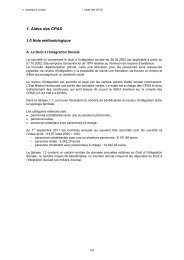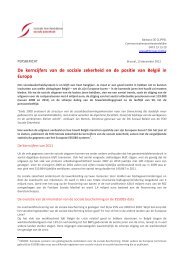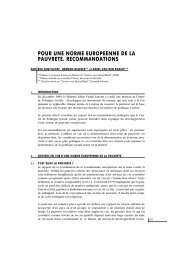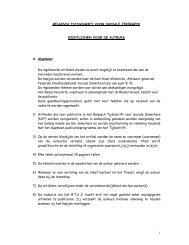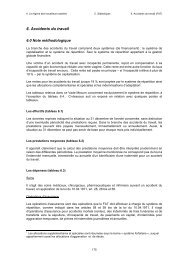- Page 1 and 2:
44e trimestre200648e année44e trim
- Page 4 and 5:
LA REFORME DE L’ETAT-PROVIDENCE A
- Page 6 and 7:
INTRODUCTIONL’ETAT DE L’ETAT-PR
- Page 8 and 9:
BELGISCH TIJDSCHRIFT VOOR SOCIALE Z
- Page 11 and 12:
L’ETAT DE L’ETAT-PROVIDENCE DAN
- Page 13 and 14:
L’ETAT DE L’ETAT-PROVIDENCE DAN
- Page 15 and 16:
L’ETAT DE L’ETAT-PROVIDENCE DAN
- Page 17 and 18:
PARTIE 1 :LES ETATS-PROVIDENCE EURO
- Page 19 and 20:
REVUE BELGE DE SECURITE SOCIALE - 4
- Page 21 and 22:
REVUE BELGE DE SECURITE SOCIALE - 4
- Page 23 and 24:
REVUE BELGE DE SECURITE SOCIALE - 4
- Page 25 and 26:
REVUE BELGE DE SECURITE SOCIALE - 4
- Page 27 and 28:
REVUE BELGE DE SECURITE SOCIALE - 4
- Page 29 and 30:
REVUE BELGE DE SECURITE SOCIALE - 4
- Page 31 and 32:
REVUE BELGE DE SECURITE SOCIALE - 4
- Page 33 and 34:
REVUE BELGE DE SECURITE SOCIALE - 4
- Page 35 and 36:
REVUE BELGE DE SECURITE SOCIALE - 4
- Page 37 and 38:
REVUE BELGE DE SECURITE SOCIALE - 4
- Page 39 and 40:
REVUE BELGE DE SECURITE SOCIALE - 4
- Page 41 and 42:
REVUE BELGE DE SECURITE SOCIALE - 4
- Page 43 and 44:
REVUE BELGE DE SECURITE SOCIALE - 4
- Page 45 and 46:
REVUE BELGE DE SECURITE SOCIALE - 4
- Page 47 and 48:
REVUE BELGE DE SECURITE SOCIALE - 4
- Page 49 and 50:
REVUE BELGE DE SECURITE SOCIALE - 4
- Page 51 and 52:
REVUE BELGE DE SECURITE SOCIALE - 4
- Page 53 and 54:
REVUE BELGE DE SECURITE SOCIALE - 4
- Page 55 and 56:
REVUE BELGE DE SECURITE SOCIALE - 4
- Page 57 and 58:
REVUE BELGE DE SECURITE SOCIALE - 4
- Page 59 and 60:
REVUE BELGE DE SECURITE SOCIALE - 4
- Page 61 and 62:
REVUE BELGE DE SECURITE SOCIALE - 4
- Page 63 and 64:
REVUE BELGE DE SECURITE SOCIALE - 4
- Page 65 and 66:
REVUE BELGE DE SECURITE SOCIALE - 4
- Page 67 and 68:
REVUE BELGE DE SECURITE SOCIALE - 4
- Page 69 and 70:
REVUE BELGE DE SECURITE SOCIALE - 4
- Page 71 and 72:
REVUE BELGE DE SECURITE SOCIALE - 4
- Page 73 and 74:
REVUE BELGE DE SECURITE SOCIALE - 4
- Page 75 and 76:
REVUE BELGE DE SECURITE SOCIALE - 4
- Page 77 and 78:
REVUE BELGE DE SECURITE SOCIALE - 4
- Page 79 and 80:
REVUE BELGE DE SECURITE SOCIALE - 4
- Page 81 and 82:
REVUE BELGE DE SECURITE SOCIALE - 4
- Page 83 and 84:
REVUE BELGE DE SECURITE SOCIALE - 4
- Page 85 and 86:
REVUE BELGE DE SECURITE SOCIALE - 4
- Page 87 and 88:
REVUE BELGE DE SECURITE SOCIALE - 4
- Page 89 and 90:
REVUE BELGE DE SECURITE SOCIALE - 4
- Page 91 and 92:
REVUE BELGE DE SECURITE SOCIALE - 4
- Page 93 and 94:
REVUE BELGE DE SECURITE SOCIALE - 4
- Page 95 and 96:
REVUE BELGE DE SECURITE SOCIALE - 4
- Page 97 and 98:
REVUE BELGE DE SECURITE SOCIALE - 4
- Page 99 and 100:
REVUE BELGE DE SECURITE SOCIALE - 4
- Page 101 and 102:
REVUE BELGE DE SECURITE SOCIALE - 4
- Page 103 and 104:
REVUE BELGE DE SECURITE SOCIALE - 4
- Page 105 and 106:
REVUE BELGE DE SECURITE SOCIALE - 4
- Page 107 and 108:
REVUE BELGE DE SECURITE SOCIALE - 4
- Page 109 and 110:
PARTIE 2 :LE BEAU VISAGE DE L’ETA
- Page 111 and 112:
REVUE BELGE DE SECURITE SOCIALE - 4
- Page 113 and 114:
REVUE BELGE DE SECURITE SOCIALE - 4
- Page 115 and 116:
REVUE BELGE DE SECURITE SOCIALE - 4
- Page 117 and 118:
REVUE BELGE DE SECURITE SOCIALE - 4
- Page 119 and 120:
REVUE BELGE DE SECURITE SOCIALE - 4
- Page 121 and 122:
REVUE BELGE DE SECURITE SOCIALE - 4
- Page 123 and 124:
REVUE BELGE DE SECURITE SOCIALE - 4
- Page 125 and 126:
REVUE BELGE DE SECURITE SOCIALE - 4
- Page 127 and 128:
REVUE BELGE DE SECURITE SOCIALE - 4
- Page 129 and 130:
REVUE BELGE DE SECURITE SOCIALE - 4
- Page 131 and 132:
REVUE BELGE DE SECURITE SOCIALE - 4
- Page 133 and 134:
REVUE BELGE DE SECURITE SOCIALE - 4
- Page 135 and 136:
REVUE BELGE DE SECURITE SOCIALE - 4
- Page 137 and 138:
REVUE BELGE DE SECURITE SOCIALE - 4
- Page 139 and 140:
REVUE BELGE DE SECURITE SOCIALE - 4
- Page 141 and 142:
REVUE BELGE DE SECURITE SOCIALE - 4
- Page 143 and 144:
LE DECLIN SILENCIEUX DU REGIME DEPE
- Page 145 and 146:
LE DECLIN SILENCIEUX DU REGIME DE P
- Page 147 and 148:
LE DECLIN SILENCIEUX DU REGIME DE P
- Page 149 and 150:
LE DECLIN SILENCIEUX DU REGIME DE P
- Page 151 and 152:
LE DECLIN SILENCIEUX DU REGIME DE P
- Page 153 and 154:
REVUE BELGE DE SECURITE SOCIALE - 4
- Page 155 and 156:
REVUE BELGE DE SECURITE SOCIALE - 4
- Page 157 and 158:
REVUE BELGE DE SECURITE SOCIALE - 4
- Page 159 and 160:
REVUE BELGE DE SECURITE SOCIALE - 4
- Page 161 and 162:
REVUE BELGE DE SECURITE SOCIALE - 4
- Page 163 and 164:
REVUE BELGE DE SECURITE SOCIALE - 4
- Page 165 and 166:
REVUE BELGE DE SECURITE SOCIALE - 4
- Page 167 and 168:
REVUE BELGE DE SECURITE SOCIALE - 4
- Page 169 and 170:
REVUE BELGE DE SECURITE SOCIALE - 4
- Page 171 and 172:
REVUE BELGE DE SECURITE SOCIALE - 4
- Page 173 and 174:
REVUE BELGE DE SECURITE SOCIALE - 4
- Page 175 and 176:
REVUE BELGE DE SECURITE SOCIALE - 4
- Page 177 and 178:
REVUE BELGE DE SECURITE SOCIALE - 4
- Page 179 and 180:
REVUE BELGE DE SECURITE SOCIALE - 4
- Page 181 and 182:
REVUE BELGE DE SECURITE SOCIALE - 4
- Page 183 and 184:
REVUE BELGE DE SECURITE SOCIALE - 4
- Page 185 and 186:
L’ETAT-PROVIDENCE EN 2005 :LA SIT
- Page 187 and 188:
L’ETAT-PROVIDENCE EN 2005 : LA SI
- Page 189 and 190:
L’ETAT-PROVIDENCE EN 2005 : LA SI
- Page 191 and 192:
L’ETAT-PROVIDENCE EN 2005 : LA SI
- Page 193 and 194:
L’ETAT-PROVIDENCE EN 2005 : LA SI
- Page 195 and 196:
L’ETAT-PROVIDENCE EN 2005 : LA SI
- Page 197 and 198:
L’ETAT-PROVIDENCE EN 2005 : LA SI
- Page 199 and 200:
L’ETAT-PROVIDENCE EN 2005 : LA SI
- Page 201 and 202:
L’ETAT-PROVIDENCE EN 2005 : LA SI
- Page 203 and 204:
L’ETAT-PROVIDENCE EN 2005 : LA SI
- Page 205 and 206:
L’ETAT-PROVIDENCE EN 2005 : LA SI
- Page 207 and 208:
REVUE BELGE DE SECURITE SOCIALE - 4
- Page 209 and 210:
REVUE BELGE DE SECURITE SOCIALE - 4
- Page 211 and 212:
REVUE BELGE DE SECURITE SOCIALE - 4
- Page 213 and 214:
REVUE BELGE DE SECURITE SOCIALE - 4
- Page 215 and 216:
REVUE BELGE DE SECURITE SOCIALE - 4
- Page 217 and 218:
REVUE BELGE DE SECURITE SOCIALE - 4
- Page 219 and 220:
REVUE BELGE DE SECURITE SOCIALE - 4
- Page 221 and 222:
REVUE BELGE DE SECURITE SOCIALE - 4
- Page 223 and 224:
REVUE BELGE DE SECURITE SOCIALE - 4
- Page 225 and 226:
REVUE BELGE DE SECURITE SOCIALE - 4
- Page 227 and 228:
REVUE BELGE DE SECURITE SOCIALE - 4
- Page 229 and 230:
REVUE BELGE DE SECURITE SOCIALE - 4
- Page 231 and 232:
L’ETAT DE L’ETAT-PROVIDENCEEN A
- Page 233 and 234:
L’ETAT DE L’ETAT-PROVIDENCE EN
- Page 235 and 236:
L’ETAT DE L’ETAT-PROVIDENCE EN
- Page 237 and 238:
L’ETAT DE L’ETAT-PROVIDENCE EN
- Page 239 and 240:
L’ETAT DE L’ETAT-PROVIDENCE EN
- Page 241 and 242:
L’ETAT DE L’ETAT-PROVIDENCE EN
- Page 243 and 244:
L’ETAT DE L’ETAT-PROVIDENCE EN
- Page 245 and 246:
L’ETAT DE L’ETAT-PROVIDENCE EN
- Page 247 and 248:
L’ETAT DE L’ETAT-PROVIDENCE EN
- Page 249 and 250:
L’ETAT DE L’ETAT-PROVIDENCE EN
- Page 251 and 252:
L’ETAT DE L’ETAT-PROVIDENCE EN
- Page 253 and 254:
L’ETAT DE L’ETAT-PROVIDENCE EN
- Page 255 and 256:
PARTIE 3 :LE BEAU VISAGE DE TROIS A
- Page 257 and 258:
REVUE BELGE DE SECURITE SOCIALE - 4
- Page 259 and 260:
REVUE BELGE DE SECURITE SOCIALE - 4
- Page 261 and 262:
REVUE BELGE DE SECURITE SOCIALE - 4
- Page 263 and 264:
REVUE BELGE DE SECURITE SOCIALE - 4
- Page 265 and 266:
REVUE BELGE DE SECURITE SOCIALE - 4
- Page 267 and 268:
REVUE BELGE DE SECURITE SOCIALE - 4
- Page 269 and 270:
REVUE BELGE DE SECURITE SOCIALE - 4
- Page 271 and 272:
REVUE BELGE DE SECURITE SOCIALE - 4
- Page 273 and 274:
REVUE BELGE DE SECURITE SOCIALE - 4
- Page 275 and 276:
REVUE BELGE DE SECURITE SOCIALE - 4
- Page 277 and 278:
REVUE BELGE DE SECURITE SOCIALE - 4
- Page 279 and 280:
REVUE BELGE DE SECURITE SOCIALE - 4
- Page 281 and 282:
REVUE BELGE DE SECURITE SOCIALE - 4
- Page 283 and 284: L’ETAT-PROVIDENCE EN ESPAGNEENTRE
- Page 285 and 286: L’ETAT-PROVIDENCE EN ESPAGNE ENTR
- Page 287 and 288: L’ETAT-PROVIDENCE EN ESPAGNE ENTR
- Page 289 and 290: L’ETAT-PROVIDENCE EN ESPAGNE ENTR
- Page 291 and 292: L’ETAT-PROVIDENCE EN ESPAGNE ENTR
- Page 293 and 294: L’ETAT-PROVIDENCE EN ESPAGNE ENTR
- Page 295 and 296: L’ETAT-PROVIDENCE EN ESPAGNE ENTR
- Page 297 and 298: L’ETAT-PROVIDENCE EN ESPAGNE ENTR
- Page 299 and 300: L’ETAT-PROVIDENCE EN ESPAGNE ENTR
- Page 301 and 302: L’ETAT-PROVIDENCE EN ESPAGNE ENTR
- Page 303 and 304: L’ETAT-PROVIDENCE EN ESPAGNE ENTR
- Page 305 and 306: L’ETAT-PROVIDENCE EN ESPAGNE ENTR
- Page 307 and 308: L’ETAT-PROVIDENCE EN ESPAGNE ENTR
- Page 309 and 310: SITUATION DE LA PROTECTION SOCIALE
- Page 311 and 312: SITUATION DE LA PROTECTION SOCIALE
- Page 313 and 314: SITUATION DE LA PROTECTION SOCIALE
- Page 315 and 316: SITUATION DE LA PROTECTION SOCIALE
- Page 317 and 318: SITUATION DE LA PROTECTION SOCIALE
- Page 319 and 320: SITUATION DE LA PROTECTION SOCIALE
- Page 321 and 322: SITUATION DE LA PROTECTION SOCIALE
- Page 323 and 324: SITUATION DE LA PROTECTION SOCIALE
- Page 325 and 326: SITUATION DE LA PROTECTION SOCIALE
- Page 327 and 328: SITUATION DE LA PROTECTION SOCIALE
- Page 329 and 330: SITUATION DE LA PROTECTION SOCIALE
- Page 331 and 332: ABSTRACTS
- Page 333: REVUE BELGE DE SECURITE SOCIALE - 4
- Page 337 and 338: REVUE BELGE DE SECURITE SOCIALE - 4
- Page 339 and 340: REVUE BELGE DE SECURITE SOCIALE - 4
- Page 341 and 342: REVUE BELGE DE SECURITE SOCIALE - 4
- Page 343 and 344: REVUE BELGE DE SECURITE SOCIALE - 4
- Page 345 and 346: REVUE BELGE DE SECURITE SOCIALE - 4
- Page 347 and 348: PRIXLe numéroEn Belgique .........



